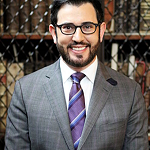Gillings faculty, students and alumni track human rights effects of COVID-19 response
November 10, 2021
The public health response to the COVID-19 pandemic was uniquely widespread and rapid, with equally widespread potential for human rights impacts across nations and throughout the world. Acknowledging the need to monitor the effects of this response in a systematic way, a group of faculty members, students and alumni of the UNC Gillings School of Global Public Health created a database that uses media coverage to monitor potential violations of human rights.

Christopher Burch
“We want this tool to motivate policy that not only offers the best public health outcomes but also fully realizes human rights,” said Christopher Burch, a member of the research team who is seeking a Master of Public Health at the Gillings School. “I am optimistic that policy makers, advocates and researchers will use these data to better respond to public health issues and emergencies as they occur.”
The result of these efforts, the UNC COVID-19 Health and Human Rights Monitor, is a global resource that tracks the human rights implications of COVID-19 response efforts as described through news reports. This new tool is freely available online and serves as a central location for researchers and practitioners to access and interact with the data the team has diligently collected over the past 18 months.

Caitlin R. Williams

Dr. Benjamin Mason Meier

Hanna Huffstetler
The team responsible for creating the COVID-19 Health and Human Rights Monitor — led by doctoral students Hanna E. Huffstetler, MPH (global health), and Caitlin R. Williams, MSPH (maternal and child health), and Professor Benjamin Mason Meier, JD, LLM, PhD, in the Department of Health Policy and Management — quickly realized that human rights would be fundamental to the success of pandemic response efforts. Yet, as SARS-CoV-2, the virus that causes COVID-19, spread throughout the world, and as national governments responded, human rights all too often appeared to be an afterthought, if considered at all. Policies needlessly or unevenly restricted movement, separated families, and neglected a range of civil, political, economic and social rights.
There were attempts to track pandemic-related human rights issues, but the team noticed that these early efforts were not comprehensive. Many focused on a narrow set of rights or type of public health response, failed to provide any means of comparing different responses across countries and crucially ignored information about the effects of inaction. To fill this gap, the team developed a method to systematically collect and code media reports about COVID-19, public health and human rights, rendering information that can be analyzed to inform future public health actions. The system also captures the effect of state inactions, which can threaten the realization of human rights. According to Huffstetler, inactions are more difficult to systematically capture through other means than actions, which typically leave a paper trail.
The fact the system allows comparison is important to policymakers, academics and human-rights advocates, who can use it to identify common occurrences and devise an effective response. It will help them balance human rights promotion with other public health imperatives and enable greater accountability — to ensure public health actions are in line with human rights principles.
“An important next step is actually analyzing the data,” said Ashley Huff, an undergraduate student who is part of the research team. “The data we’ve collected provides an important insight into the early stages of the pandemic when states were deliberating over policies that closed down borders, economies and public life. It will be interesting to examine variation in these policies and how those variations were seen to impact human rights.”
The field of health and human rights explores the intersection of global health and human rights, which are inextricably linked. It recognizes that good health – a state of complete physical, mental and social well-being – is a basic right and provides a legal framework for protecting it. Acknowledging that good health relies on underlying social, economic and political factors, such as housing and access to education, is important in understanding the effects of policy, and government action or inaction, on it.
The United Nations’ Universal Declaration of Human Rights was an important postwar milestone in shaping our understanding of, and providing a modern legal basis for, fundamental human rights, including freedom from cruelty and torture and slavery. The Tuskegee Syphilis Study, systematic separation of Native American children from their families, and other past abuses of human rights in the name of public health show that this principle is integral to effective public health. International standards make it a legal obligation for countries to pursue the highest attainable standard of health for all people.

Aoife O’Connor
“Too often I think that those in power see human rights as a barrier to being able to take swift public health action, rather than recognizing that human rights and public health work synergistically to improve the health and well-being of populations,” said Aoife O’Connor, MPH (public health leadership program), a Gillings alum who is part of the research team. “Human rights aren’t only a desirable feature to have in good public health policy, they are essential.”
By monitoring 17 different public health actions and inactions and 24 distinct human rights worldwide, the COVID-19 Health and Human Rights Monitor provides a

Moonwon Seo
foundation for future research and advocacy to inform public policy. This UNC research team is already using this database in their research to examine human rights violations in the pandemic response, and as advocacy for human rights mainstreaming in a prospective pandemic treaty through the World Health Organization.
“I hope the future of public health is one where global solidarity, global health governance and human rights are championed and recognized as integral to effective public health emergency preparedness and response,” said Moonwon Seo, a recent UNC graduate who also is part of the research team. “I believe this database, properly utilized, can serve to advance this very hope.”
The team published preliminary results from an early analysis of the data in March 2021 and is formally launching the database on November 12.

Contact the UNC Gillings School of Global Public Health communications team at sphcomm@unc.edu.
